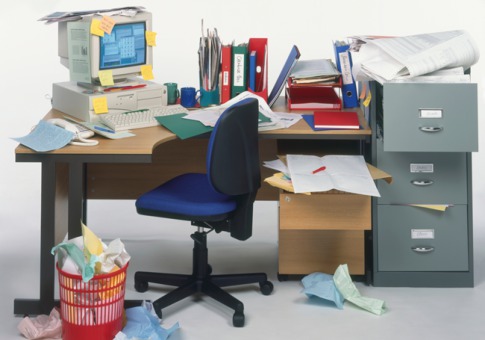In a 2011 study at Princeton University Neuroscience Institute, researchers found that “Multiple stimuli present in the visual field at the same time compete for neural representation by mutually suppressing their evoked activity throughout visual cortex, providing a neural correlate for the limited processing capacity of the visual system.”
Leading to the conclusion that clutter suppresses the proper functioning of the brain by limiting a person’s ability to focus.

Photo by Dorling Kindersley/Getty Images
Clearing out clutter at home and in the office can improve productivity. Financial clutter in particular piles up fast unless we keep an eye on it.
“A clean and well-organized financial house provides a clear financial path for reaching your financial goals,” stated Money Management International in a recent press release offering tips on how to clear financial clutter.
Money Management International is a nonprofit, full-service credit-counseling agency, providing confidential financial guidance, financial education, counseling and debt management assistance to consumers since 1958
“Before you toss your financial file cabinet out with the other household clutter, you should know that some things are worth keeping,” advises Jo Kerstetter, vice president of financial education for MMI. “The key is to know which items to keep and which to toss.”
- Keep tax returns for six years. The IRS can audit your return for only three years after filling, but they can challenge your return for up to six years if they suspect under reporting of income by more than 25 percent.
- Keep investment records for seven years. Annual real estate statements and other records of investments may come in handy for tax purposes. Toss monthly statements, but keep annual correspondence for seven years post sell.
- Keep W2s and tax statements until you retire. Income statements and other documentation is the best proof of earnings for social security benefits.
- Toss paycheck stubs after bank deposit. In some cases a paycheck stub may be helpful in addressing errors concerning income reported on W2s, but a record of direct deposit can serve the same purpose.
- Toss insurance paperwork after expiration. Liability policies with “occurrence” coverage are the only policies that should be retained after expiration. This type of liability protection covers you for damages occurred while the policy was in effect — even if the claim happens after coverage expires.
- Toss credit card receipts after monthly statement review. Additionally, credit card monthly statements should be destroyed annually.
- Finally, before taking out the trash, be sure that all personal identifying information has been destroyed to avoid any threat of identity theft. To keep your most valuable documents safe, consider opening a safety-deposit box at your local bank or credit union.
Would you like to share some tips of your own? Leaving a comment.
—————————
Join our mailing list for your free monthly newsletter
